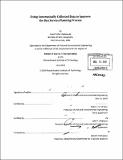Using automatically collected data to improve the bus service planning process
Author(s)
Fijalkowski, Jared Arthur
DownloadFull printable version (12.39Mb)
Other Contributors
Massachusetts Institute of Technology. Dept. of Civil and Environmental Engineering.
Advisor
Nigel H. M. Wilson and John P. Attanucci.
Terms of use
Metadata
Show full item recordAbstract
Most large transit agencies have shifted from collecting transit performance data manually to using automated data systems to measure performance. These systems, which include Automatic Vehicle Location (AVL), Automatic Passenger Counters (APC), and Automated Fare Collection (AFC), enable transit agencies to (1) collect larger and more detailed sets of performance data, (2) measure transit performance more from the perspective of customers, and (3) conduct more systematic service evaluation processes. While many transit agencies have adopted these data collection technologies, many have not modified their service planning processes to reflect the full advantages of automated data systems. This thesis evaluates the current performance metrics used by the Chicago Transit Authority (CTA) and the Massachusetts Bay Transportation Authority (MBTA) in their respective service planning processes. A set of recommended performance metrics are proposed in the categories of bus loading, service reliability, passenger demand, and cost effectiveness that take advantage of the benefits of automatically collected data. Next, a service planning process is proposed by which transit agencies can use automatically collected data to systematically evaluate bus transit performance at the route, corridor, and system levels. In addition to making general recommendations applicable to all large transit agencies, this thesis makes specific recommendations for the CTA and the MBTA to improve their respective service planning processes to make full use of the capabilities of automated data systems. This thesis finds that performance metrics which take advantage of the large and detailed data sets that automated data systems provide can more accurately and acutely identify performance problems, leading planners to develop better solutions. Also, the efficiencies in automated data collection compared with manual data collection allow transit agencies to perform a more comprehensive and systematic process by which the performance of all transit service is evaluated on a regular basis. Finally, while automated data systems provide a high level of detail about bus transit performance, contextual information about route operations remains critical to accurately identifying and resolving performance problems.
Description
Thesis (S.M. in Transportation)--Massachusetts Institute of Technology, Dept. of Civil and Environmental Engineering, 2010. Cataloged from PDF version of thesis. Includes bibliographical references (p. 129-131).
Date issued
2010Department
Massachusetts Institute of Technology. Department of Civil and Environmental EngineeringPublisher
Massachusetts Institute of Technology
Keywords
Civil and Environmental Engineering.